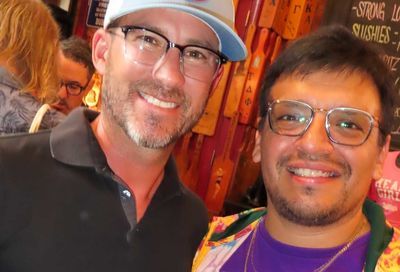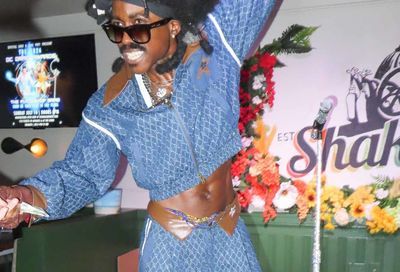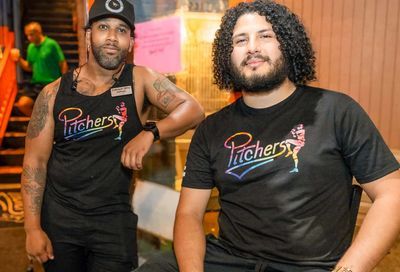Nada Surf’s Matthew Caws: Music is ‘Just Wishing There Was a Better Place’
Nada Surf plays a free outdoor concert on Saturday, July 30, at Herndon's Arrowbrook Centre Park. We speak with singer Matthew Caws.

When Nada Surf plays Arrowbrook Centre Park in Herndon on Saturday, their typical closer, “Blankest Year,” will not appear on the setlist.
“‘Blankest Year’ has a chorus of ‘fuck it,’” laughs the band’s frontman Matthew Caws. “We always ask the audience to sing along with us, and we all sing, ‘fuck it,’ together.” But the Northern Virginia outdoor concert is free to the public and considered a family event, so organizers have politely requested the song not be performed.
“I think it’s all right to be asked not to do that,” says Caws, congenial and relaxed on a Zoom call from his home in England. The artist adds, however, that most of the band’s melody-infused hits will be on tap, including “So Much Love,” “Always Love,” and “Inside of Love.” He laughs. “It’s silly to have three songs with the word love, but maybe that’s all right. Maybe it’s not silly at all. Maybe it’s good.”
Formed in 1992 by Caws and childhood friend Daniel Lorca, the alternative rock group’s bassist, Nada Surf is known for its shimmering, catchy melodies and poetically resonant lyrics. Never Not Together, the band’s most recent studio album, its ninth, was released in 2020 and is a string of nine masterworks that speak potently to the human condition, touching on everything from “differentiating between real and imagined dangers” (“Looking for You”) to finding one’s true soulmate (“Crowded Star”) to the reconciliation of gender through a child’s eyes (“Mathilda”).
“Mathilda,” in particular, resonates with the LGBTQ community, in its message about how bucking gender norms, willfully or not, becomes a target for bullies on the school playground. Caws is straight, but he is very much an outspoken ally of the LGBTQ community, and his song recounts the time in his life when, as a boy, he was teased for his appearance and mannerisms.
“They used to call me Mathilda / My mama kept my hair long / I was more pretty than handsome / And I was not very strong / My voice was kinda high / Not a typical guy,” the lyrics go, punctuated with an “I didn’t get mad / I got sad about it.”
As the song deepens, Caws sings, “Just kids, we have our tests / Look at your nails, is your palm out? / If you hold your hands unlike a man, it’s not allowed.”
At six minutes, with powerful dynamic shifts, “Mathilda” is an autobiographical opus, a clearly personal song for Caws. He could have left his memories buried, but, like all great songwriters, he draws the topic into the light, illuminating listeners on the larger meanings behind it, offering food for thought.
“I was, what would be considered by most, to be a feminine-looking child,” the 54-year-old recalls. “I had a high speaking voice and was a little shy, not particularly rough and tumble, kind of quiet, a joyful kid, but also nervous. This all added up to being called this name, and my experience of it was complex, in a way that I’m grateful for, and complex because, at school, it was a little scary, but not threatening — enough so that I got to be in the moment and just experience it without it being a panic.
“The other thing is that at home, my father, who passed away a couple of years ago, was a wonderful father,” he continues. “He was a philosopher, and incredibly kind and loving. And while he was, what you would also call, more masculine than me, he didn’t notice or mind at all how I presented.
“The reason I bring that up is because if it was noticeable enough for kids at school to point out, it might have been noticeable to a father. And if it had been noticeable to a father who was embarrassed by that, or felt that his masculine cred was challenged by his son’s manner or appearance, he might have been angry about it or taken it out on me.
“But there was none of that. I came home to a safe home and, of course, I’m grateful for that. It saved me from having a very negative experience.
“I very often have a Pollyanna wish that there was a solution to things,” he concludes. “Maybe I bemoan the lack of solutions and wish there was one. But music is like that, right? It’s just wishing, and wishing there was a better place, or that this was a better place, or that there was a better way for us to reach it.”
Nada Surf plays Saturday, July 30, at Arrowbrook Centre Park, 2351 Field Point Road, in Herndon, Va. Admission is free. Gates open at 6 p.m. Wine tastings and sales by the Winery at Bull Run and Paradise Springs Winery. In case of inclement weather, call 703-324-7469 one hour ahead of the performance for rain date information. Visit www.fairfaxcounty.gov/parks/performances.
Stream Nada Surf on all major platforms. Visit www.nadasurf.com and follow the band and Matthew Caws on Twitter at @NadaSurf. Connect with other Nada Surf fans on Twitter at @nadasurftalk.
Support Metro Weekly’s Journalism
These are challenging times for news organizations. And yet it’s crucial we stay active and provide vital resources and information to both our local readers and the world. So won’t you please take a moment and consider supporting Metro Weekly with a membership? For as little as $5 a month, you can help ensure Metro Weekly magazine and MetroWeekly.com remain free, viable resources as we provide the best, most diverse, culturally-resonant LGBTQ coverage in both the D.C. region and around the world. Memberships come with exclusive perks and discounts, your own personal digital delivery of each week’s magazine (and an archive), access to our Member's Lounge when it launches this fall, and exclusive members-only items like Metro Weekly Membership Mugs and Tote Bags! Check out all our membership levels here and please join us today!


























You must be logged in to post a comment.